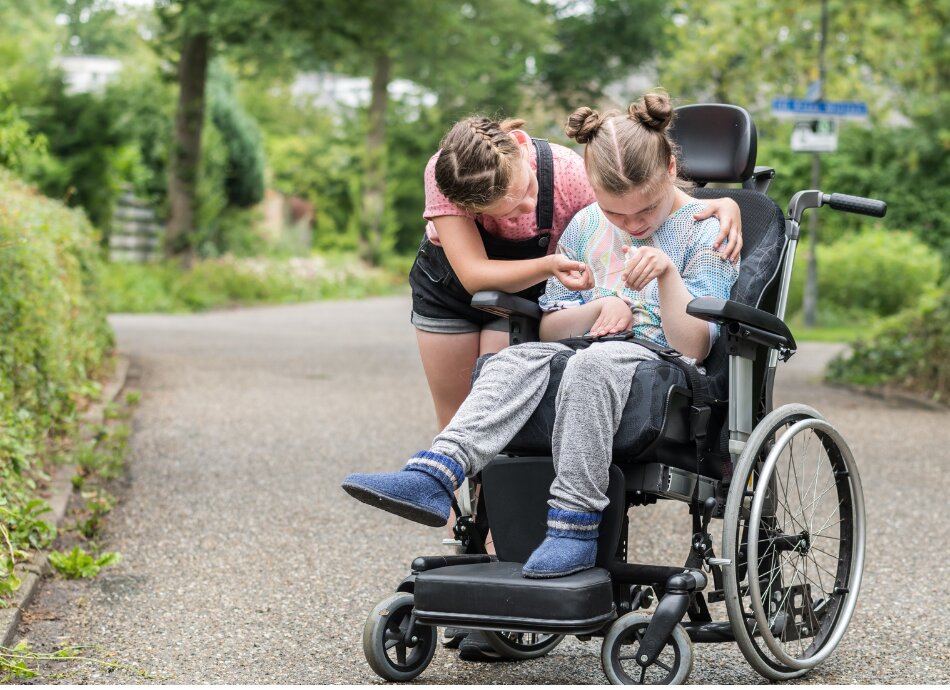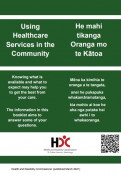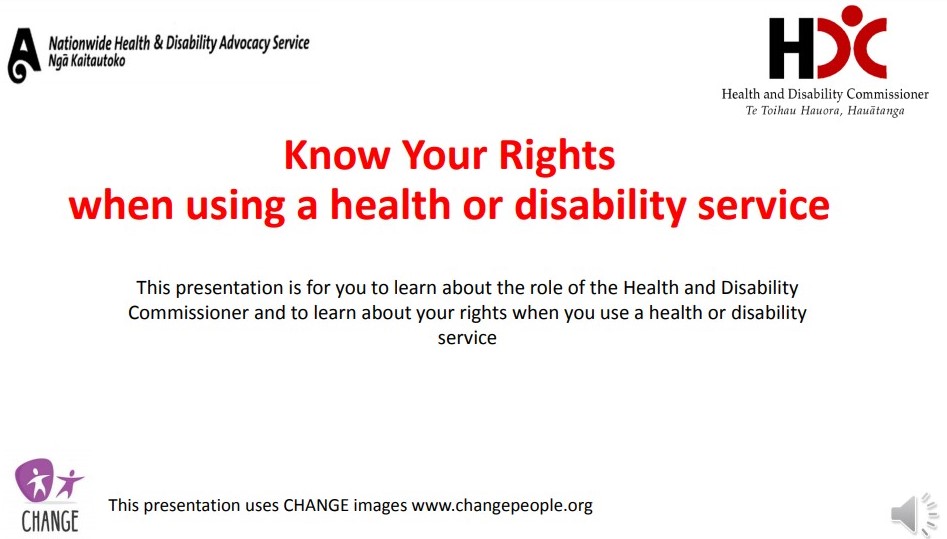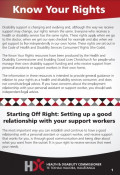You can now add Healthify as a preferred source on Google. Click here to see us when you search Google.
Disability services
Key points about disability services
- If you have a disability, or care for someone with a disability, there is support available.
- This page provides an overview of some of the disability programmes and services available in Aotearoa New Zealand, and how to access disability services in your area.
- When you use a health or disability service in Aotearoa New Zealand, you have the protection of the Code of Health and Disability Services Consumers' Rights.

Terminology
When the New Zealand Disability Strategy was being developed there was discussion about using the term 'disabled people' or other options such as 'people with disabilities' or 'people with experience of disability'. The Ministry of Social Development provides some background to the decision to use the term 'disabled people' in Aotearoa New Zealand.
The reasoning was as follows:
- People are people first.
- They have particular impairments or conditions, that is, they are people with impairments (eg, a person with a vision impairment, or a hearing loss, or limited mobility).
- Attitudinal and physical barriers in the world we all live in disable them.
- Therefore, they are disabled people (or, more accurately, people disabled by the way we build and organise our world). 'Disabled' refers to things outside the person that impact on them and put barriers in the way of their participation.
For this reason we refer to disabled people throughout this page.
However, individuals and groups can continue to use the language they feel most comfortable with, such as 'people with an intellectual disability' or 'people with learning disabilities'. Read more about disability language(external link).
Disability services framework
In 2011, members of the disability community developed the Enabling Good Lives (EGL) framework to help disabled people, their families, and communities make positive changes. The EGL approach aims to give disabled people and their whānau more control over their lives and the support they receive.
In Aotearoa New Zealand, disabled people, Māori and government agencies are working together to build a disability support system in line with the EGL approach.
We also have a Code of Health and Disability Services Consumers' Rights that outlines the rights of people using health and disability services, and the duties of service providers to comply with the Code.
The Code of Health and Disability Services Consumers' Rights outlines the rights of individuals receiving health and disability services in Aotearoa New Zealand. Here are the key points:
- The right to be treated with respect | Mana
- The right to fair treatment | Manaakitanga
- The right to dignity and independence | Tū rangatira Motuhake
- The right to appropriate standards | Tautikanga
- The right to effective communication | Whakawhitiwhitinga whakairo
- The right to be informed | Whakamōhio
- The right to choice and consent | Whakaritenga mōu ake
- The right to support | Tautoko
- Rights during teaching and research | Ako me te rangahau
- The right for your complaint to be taken seriously | Amuamu
The Code is currently under review which means the New Zealand Government may make changes to it in future. Read more about the Code of Health and Disability Consumers’ Rights.(external link)
You can also read about your rights and what to do if you have any concerns on the Health and Disability Commissioner website(external link).
For disabled people, whānau and carers in Aotearoa New Zealand, talking to your healthcare provider and looking at the Enabling Good Lives website are good starting points for finding out about disability support services.
Enabling Good Lives (EGL) is a new approach that puts disabled people and their whānau at the centre. You’ll find practical tools to help you make EGL-based changes in your community. You can also read stories about how EGL has improved and changed lives.
Visit the Enabling Good Lives website(external link).
Disability Support Services (DSS) is a team within the Ministry of Social Development (MSD). They help about 50,000 disabled Kiwis and their whānau. They also provide equipment and home modifications for about 100,000 New Zealanders.
The DSS website has information on assessment and funding(external link) where you can find out what support is available.
Support and services(external link) include:
- Housing and transport(external link) including home modifications, help around the home.
- Education and employment(external link) support and resources.
- Health and wellbeing(external link) assistance and support.
- Equipment and aids(external link) to support you with communication or daily tasks.
DSS also has a regular newsletter with up-to-date information for disabled people, their whānau, aiga and carers. Sign up for the newsletter.(external link)
You can contact Disability Support Services by using their website(external link), by emailing [email protected] or by phoning 0800 566 601 (Monday to Friday).
There are many Māori and Pasifika groups providing disability services. They can offer support, advice, and help you fight for your rights. Find out more about them and how they can help you.
Find a range of Māori support and advice services(external link).
Find a range of Pacific Peoples support and advice services(external link) including information about Faiva Ora, a group that represents Pacific Peoples with disabilities in Aotearoa New Zealand. They work to improve the lives of Pacific Peoples with disabilities, and make sure their voices are heard.
The New Zealand Needs Assessment Service Co-ordination Association (NASCA) is a non-profit organisation that represents groups providing support for people with disabilities and mental health issues, including:
- children and adults with disabilities that occur under 65 years of age
- people with mental health issues
- older people needing age-related support.
NASCA's main goal is to help individuals lead fulfilling lives. Learn more about disability NASCA services(external link).
NASC services are available across most regions of Aotearoa New Zealand. Your NASC team will help you plan the support and services you need to live the life you want. Find your local NASC(external link).
The Total Mobility scheme is a service across Aotearoa New Zealand to help people with disabilities who can't use public transport to get around. It covers taxis and helps pay for wheelchair hoists in taxis, providing a door-to-door transport service.
Users of the scheme get a subsidy of 75% off the fare for each trip, but there's a maximum limit on how much you can get back, and it depends on where you are. You can find the specific limits for your area under the regional information in this guide(external link). If your total fare is higher than the maximum subsidy, you'll need to pay the extra amount yourself.
Read more about the Total Mobility scheme in Aotearoa New Zealand.
To find a disability service in your area, use the location filter under the map (mobile view) or at the bottom of the search results (computer view).
Source: HealthPoint services directory used with permission.
Enabling Good Lives(external link) NZ
Māori disability support services(external link) Disability Support Services, NZ
Pacific disability support services(external link) Disability Support Services, NZ
Health and Disability Commissioner(external link) NZ
Disability NASC Services(external link) NZ
Disability Connect(external link), NZ – a Disability Information Advisory Service based in Auckland.
What happens after you make a complaint to the Health and Disability Commissioner? – Easy read(external link) Health & Disability Commissioner, NZ
Strategic priorities(external link) CCS Disability Action, NZ
MASH Trust, NZ(external link) MASH Trust is a charity that provides a wide range of support services for people with mental health conditions, disabilities, alcohol and addiction struggles and youth respite care.
IHC, NZ(external link) IHC advocates for the rights, inclusion and welfare of all people with intellectual disabilities and supports them to live satisfying lives in the community.
Brochures
Total mobility around New Zealand(external link) Waka Kotahi, NZ Transport Agency, NZ
NZ Disability Strategy 2016-2026(external link) Office for Disability Issues – this strategy guides the work of government agencies on disability issues.
Know your rights when using a health and disability service(external link) Health and Disability Commissioner, NZ
Personal space – support workers in your home(external link) Health and Disability Commissioner, NZ
Starting off right – setting up a good relationship with your support workers(external link) Health and Disability Commissioner, NZ
References
- Disability Support Services(external link) NZ, 2024
- About the Act and the Code(external link) Health and Disability Commissioner, NZ, 2023
- System transformation and Enabling Good Lives(external link) Whaikaha, Ministry of Disabled People, NZ, 2024
- Health and Disability Commissioner website(external link) NZ, 2024
- The New Zealand Needs Assessment Service Co-ordination Association (NASCA)(external link) NZ, 2024
- Total Mobility scheme(external link) NZ Transport Agency, 2024
- Disability language – words matter(external link) Ministry of Social Development, NZ
Brochures

Using healthcare services in the community
Health and Disability Commissioner, NZ, 2021

Know your rights when using a health and disability service
Health and Disability Commissioner, NZ

Starting off right – setting up a good relationship with your support workers
Health and Disability Commissioner, NZ
Credits: Healthify editorial team. Healthify is brought to you by Health Navigator Charitable Trust.
Last reviewed:





